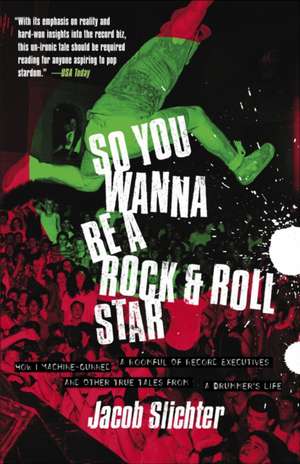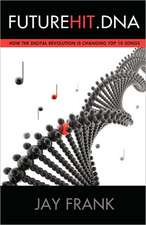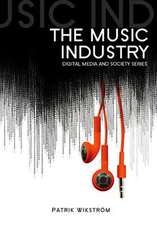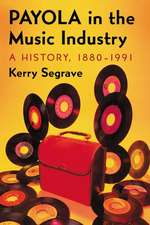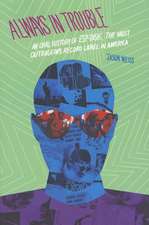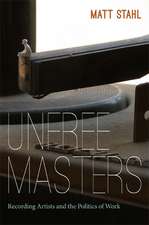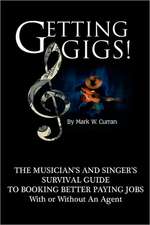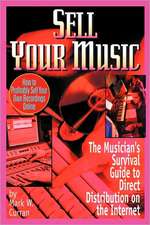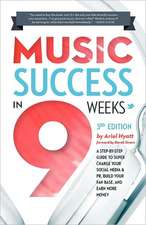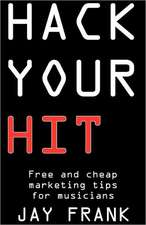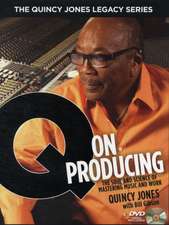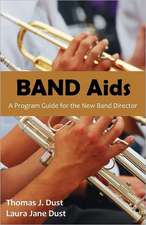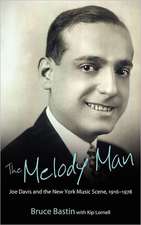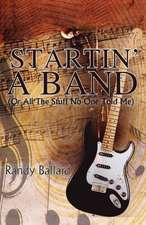So You Wanna Be a Rock & Roll Star: How I Machine-Gunned a Roomful of Record Executives and Other True Tales from a Drummer's Life
Autor Jacob Slichteren Limba Engleză Paperback – 30 apr 2005 – vârsta de la 14 până la 18 ani
So You Wanna Be a Rock & Roll Star is a telling and witty look at what happens just before and during one's time in the spotlight. Jake takes readers on a step-by-step journey of his evolution from fledgling drummer to globetrotting performer and proves to be the perfect guide—feisty and humbled—to the inner workings of the music industry and instant celebrity. So You Wanna Be a Rock & Roll Star speaks to all of us who dream again and again of rock superstardom and shows how one kid can go from picking up a pair of drumsticks to picking up a platinum record.
Preț: 106.48 lei
Nou
Puncte Express: 160
Preț estimativ în valută:
20.39€ • 20.81$ • 17.16£
20.39€ • 20.81$ • 17.16£
Carte disponibilă
Livrare economică 04-18 februarie
Preluare comenzi: 021 569.72.76
Specificații
ISBN-13: 9780767914710
ISBN-10: 0767914716
Pagini: 304
Dimensiuni: 133 x 205 x 17 mm
Greutate: 0.25 kg
Editura: BROADWAY BOOKS
ISBN-10: 0767914716
Pagini: 304
Dimensiuni: 133 x 205 x 17 mm
Greutate: 0.25 kg
Editura: BROADWAY BOOKS
Recenzii
“If I was nineteen again and lusted after the game of music, this book would be my guide and charm.”
—Andrew Loog Oldham, former manager of the Rolling Stones
“Still wondering what your college band coulda been? This giddy, can-you-believe-my-luck book is for you.” —Time Out New York
“Slichter’s most impressive attribute is his unfailing enthusiasm for his craft and for music in general.” —James McMurtry, The New York Times Book Review
“[Jacob Slichter] is a self-effacing, good-humored, and intelligent guide through the musical maze…. Few first-person memoirs of the rock biz are as smart, honest, and entertaining as this tart, incisive work.” —Kirkus Reviews (starred review)
—Andrew Loog Oldham, former manager of the Rolling Stones
“Still wondering what your college band coulda been? This giddy, can-you-believe-my-luck book is for you.” —Time Out New York
“Slichter’s most impressive attribute is his unfailing enthusiasm for his craft and for music in general.” —James McMurtry, The New York Times Book Review
“[Jacob Slichter] is a self-effacing, good-humored, and intelligent guide through the musical maze…. Few first-person memoirs of the rock biz are as smart, honest, and entertaining as this tart, incisive work.” —Kirkus Reviews (starred review)
Extras
Chapter I
Jump Start
It's never snowed in Minnesota during the month of July. The boundary waters up north, however, have tasted light accumulations in August and June, and as for the months in between, keep those winter boots handy. From autumn to spring, Minnesota is a frozen soundscape of snowplows, snow shovels, windshield scrapers, and auto ignitions laboring to turn over. Once, to get into my ice-entombed car, I needed a rubber mallet, seventy-five feet of extension cord, and a blow dryer. The long brutal winters, however, are sometimes credited with fostering Minneapolis's vital music scene. Without such horrible weather keeping them inside with their guitars, the theory goes, the world might never have heard of Bob Dylan, Prince, the Suburbs, the Replacements, Husker Du, Babes in Toyland, the Time, Soul Asylum, or the Jayhawks.
It takes more than blizzards and musicians to sustain this thriving scene. It takes fans, and the fans in the Twin Cities are famous for pushing their cars out of snowdrifts, driving down to Minneapolis's prized rock club, First Avenue, and lining up around the block in subzero temperatures on a weekday night to get through the doors before the tickets sell out. Those fans and the bands they love make a potent combination. I'll never forget watching Soul Asylum rule the stage while the body heat from the crowd of 2,000 thawed my frozen jaw. With their amplifiers turned up past the breaking point, the band spilled back and forth across the stage and brought the crowd seesawing with them, as if we were all on the deck of a ship. Singer Dave Pirner whipped his long hair in circles and screamed, "I want somebody to shove! I need somebody to shove! I want somebody to shove me!" An overexcited fan launched a cup of beer from twenty rows back, and it soared over the crowd and exploded on Karl Mueller's bass guitar. Pirner pointed into the crowd and shouted into the mike. "We're gonna find out who fuckin' threw that, and when we do, we're gonna kick your ass. And everyone here's gonna help us do it!" The crowd roared its approval.
I was a musician in my early thirties, still living under the cloud of disappointment that had followed me since graduating six years earlier from Harvard, a place for which I was poorly prepared and which in every regard had annihilated my self-confidence. I had intended to major in music, but after completing a year of study at the Berklee College of Music, for which Harvard's music department had promised me credit, I received a cold letter from the chairman of the department rescinding this promise and inviting me to find another course of study. I wandered from major to major, eventually settling on Afro-American studies, where I quietly explored my interests in race, politics, music, and literature. I entertained visions of graduate school, but such daydreaming was brought to an abrupt end when I opened the envelope containing the miserable grade given to my senior thesis, and the accompanying terse comments on its shabbiness. I graduated with a lackluster record and threw my diploma in a storage box. So much for plan B; back to plan A--rock stardom.
I proceeded with a move to San Francisco. I worked at various day jobs--selling synthesizers and drum machines at Guitar Center, making copies and filing them for executives at Chevron, and then administering the office of Saint Gregory's Episcopal Church--and wrote songs at night, recording them in my bedroom. Alas, songwriting vexed me. The emotions that I longed to put into words and music proved beyond my reach whenever I laid my fingers on a guitar, piano keyboard, or pen. I wanted to address themes of social justice through the poetry of personal reflection. What I ended up with were a stack of legal pads filled with half-finished lyrics, manuscript paper with half-finished melodies, and a cassette of the twelve songs I managed to write in five years. The extent of my public performances was also minimal, spanning a period of three months during which my friend Hal Movius and I performed on the stages of the Paradise Lounge and the Hotel Utah. On these five or six occasions, we were applauded thoughtfully by a few strangers and enthusiastically by twenty members of Saint Gregory's Church.
I left San Francisco with little to show for my musical aspirations and hoped the legendary scene in Minneapolis would be the launch pad for a career that had not yet gotten off the ground. I knew a number of musicians in town, but for the most part I continued to do what I had done in San Francisco--work a day job and write and record songs in my basement studio at night, playing the drums, keyboards, and making use of my fledgling skills on guitar. The rare feat of finishing a song was cause for celebration. I'd listen to the recording for days, triumphant at first and then mortified by its shortcomings--my sugary melodies and lyrics, my inept guitar playing, and most of all my quavering baritone voice. As I lay in bed at night, I'd hear another page tearing off of my life's shortening calendar. I was running out of time, hair, and dignity. The mantle of failure weighed on me, no place more than at my day job downtown, where I attended to the photocopying and envelope-stuffing needs of executives who sold retirement plans.
"So, Jake, I hear you're a musician. What kind of music do you play?"
"It's . . . hard to describe."
"I see. Where do you play?"
"I have a studio in my basement."
"Good for you. I need five hundred copies of this report stapled and collated by the end of the day."
By contrast, my closest friends in town had no day jobs; they had a record deal with A&M Records. Dan Wilson, a friend of mine from college, his brother Matt, John Munson, and Elaine Harris were the members of Trip Shakespeare, a rock band whose dark psychedelic sound entranced fans around the country, and especially in the Midwest, where they performed for capacity crowds at the Metro in Chicago, the Shadow in Kansas City, and First Avenue in Minneapolis. To dine out with Dan, John, Matt, or Elaine was an exciting chance to be seen with a rock star who needed an unlisted phone number. It was also an occasion to silently compare career stats between them and me: one record deal to none, four albums to none, tens of thousands of fans to none.
Dan was the closest of these friends. I had met him during our freshman week at Harvard, when he heard me playing the drums in a dormitory common room. He stuck his head in the door and said, "I'll be back with my bass." (He played bass in college and later switched to guitar.) We jammed for several hours that day and in the following weeks. Our musical tastes ran in different directions--I stuck to soul and funk, while Dan was more excited by English rock and punk--so it wasn't until our senior year that we played in a band together.
It was with Dan that I moved to San Francisco, following the trail of his girlfriend, Diane. Dan and I shared an apartment, where I saw his exhausting focus firsthand. A Phi Beta Kappa, he had graduated Harvard summa cum laude and won the Louis Sudler Prize in the Arts, awarded to the senior who demonstrates outstanding artistic achievement, which in Dan's case was not in music but painting. In San Francisco, he carried on a double artistic life, painting and songwriting, in addition to working various day jobs. Even his days off began with a double shot of espresso and then proceeded with a furious pace of activity that was unsettling to watch, especially given my meager output. The sound of his pen scrawling across the pages of his journal could keep me from reading. (Today, the snap of his fingers on a computer keyboard can make one twitch.) In conversation, his eyes focused into an intent gaze and often he'd hold up his hand like a stop sign. Then, having remembered some forgotten task, he'd get up and disappear for a twenty-minute flurry of phone calls. Upon returning to the room, he might sit down and stare at me.
"Jake, I have a question for you."
"Yes."
"How would you like to go with me to look at some photographs at the museum, get a bowl of fish soup, drop in on Diane, and then get the new R.E.M. album on the way home?" Even his mornings off intimidated me. We had planned to start a new band together, but it never happened. Within two years, Dan returned to his hometown of Minneapolis to join Trip Shakespeare, which his brother Matt had started. While touring and recording, he continued his parallel career as a painter and had two successful gallery shows in Minneapolis.
The occasion of Dan and Diane's wedding provided my first opportunity to visit Minneapolis and glimpse its famed music scene for myself. In three days, I met a dozen musicians, several of whom encouraged me to relocate to the Twin Cities. The following year, I did, and before long I was standing in the crowd at First Avenue, awed by the spectacle of Dave Pirner promising revenge on behalf of his beer-splattered bass player.
I got to know Dan's bandmate John after moving to Minneapolis, when for a brief time we shared an apartment. He had dropped out of college, where he had studied Chinese, to play in bands and make records. John's days started slowly, and it wasn't unusual for me to return from my day job to find him sitting on the couch, luxuriating in a pair of flannel-lined jeans and a soft wool sweater, stroking his cat, and savoring a cigarette and a glass of merlot while listening to Charles Mingus. As evening arrived, he might stand up and yawn and then, after gliding through the streets in a battered but well-heated 1967 Sedan de Ville, drop in on a friend unannounced. Occasionally, without consulting the weather forecast, he would disappear into the woods on the Canadian border for solo camping trips whose length was never predetermined. His friends held their breath waiting for his return, and when he resurfaced to knock on a friend's door at bedtime, he would walk in, sit down in the living room, and recount with nonchalance nearly freezing to death in his tent and his subsequent escape from a blizzard.
As apartment sharing goes, it's hard to say which threatened me more, Dan's harrying productivity or John's alarming commitment to relaxation. John's casual manner, however, belied the fact that he was the best musician in any of the Minneapolis rock bands. There was no question in my mind that he was better on bass than anyone else was on guitar, piano, or drums. In addition to that, he was a gifted producer whose talents were in constant demand. For a man who seemed to ease through life, John had produced several albums and EPs for Minneapolis bands and singer/songwriters--this in addition to rehearsing, touring, and recording with Trip Shakespeare. Indeed, it was hard to reconcile the volume of his studio accomplishments and the long hours of practice apparent in his bass playing with the same John Munson who held court in local restaurants, bars, and rock clubs, and, during the summer, on the golf course.
Both Dan and John served as mentors for my musical pursuits, listening to my songs and basement recordings, and giving me advice and encouragement. The two of them turned me on to new music, introduced me to other musicians around town, and encouraged me to write more songs and perform them, but I continued to flounder.
Then, in the summer of 1992, a friend of ours, Heather Keena, asked John and Dan to play at her college graduation party. She suggested they ask me to play drums, perhaps in the interest of keeping a low-key affair intended for friends from escalating into a madhouse of Trip Shakespeare fans. This was a great opportunity to show off my drumming, my greatest strength as a musician and, as Dan stressed, something I had long ignored. I would be seen and heard playing with two stars of the Minneapolis scene, the two best musicians I knew.
Hours before the party, Dan with his guitar and John with his bass joined me in my basement, and we learned a dozen sixties and seventies covers. That night, the three of us climbed up onto the small stage at the 400 Bar and slammed through "In Dreams" by Roy Orbison, "Drift Away" by Dobie Gray, and whatever other songs we could remember from our afternoon rehearsal. Dan's brother Matt played with us for a song, and Dave Pirner of Soul Asylum joined us for "Dancing in the Moonlight" by King Harvest. Sharing the stage with these local luminaries was a rush, as were the cheers that greeted our strong performance.
This impromptu set was such a success that in the ensuing weeks the three of us recorded some new songs of Dan's (with small contributions from me)--songs that suited the bare textures of our trio more than the ornamented arrangements of Trip Shakespeare. The recordings turned out great, and Dan and John thought our trio would make an interesting side project. Dan named our band Pleasure, and we looked ahead to a gap in Trip Shakespeare's schedule when we might be able to record a cheaply made album. A pair of jumper cables had thus been fastened to my lifeless career.
Meanwhile, Trip Shakespeare's voyage through the music business was not going well. They had signed their record deal just as Nirvana and Pearl Jam were changing the rock-and-roll landscape with the massive success of the grungy Seattle sound. Trip Shakespeare's sound, by contrast, was built on three-part vocal harmonies sung with operatic fervor, quirky instrumental arrangements (employing sleigh bells, bongos, and xylophones), and lyrics written in elevated speech ("In the honey time of youth / When the wind had sweet breath / When the rent was way down / I would haul for no man"). Though they sold out large clubs, they were ignored by radio, and the band members complained of a lack of support from their label, A&M Records. Trip Shakespeare's albums were often missing from record stores in the towns where they performed. As the three of us recorded in my basement, Dan and John began to tell of Trip Shakespeare's tangled negotiations with their label concerning the band's most recent recordings. Then came a devastating shock: A&M dropped Trip Shakespeare from their record contract. A few days later, under growing stress, the band members decided to take some time off, and soon it was clear that Trip Shakespeare had broken up.
Now our side project became Dan and John's main focus, as it already was for me. Dan laid out a musical manifesto. Whereas Trip Shakespeare had intentionally cordoned itself off from other music of the day, Dan wanted to make music that was a part of what was happening now. For the past year, Nirvana had been blasting everyone away with the force and fury of their sound. The radio was filling up with imitators, but Dan saw that no one would be able to sound bigger or angrier. Instead, he wanted to anticipate a post-Nirvana world with music less centered on rage, though undoubtedly inspired by the scale of Nirvana's sound. He was inspired by the melodic and lyric-based songwriting of indie bands like R.E.M., the Replacements, and Teenage Fanclub. Both he and John enjoyed the brilliant recording experimentations of other bands such as My Bloody Valentine, the Flaming Lips, and Swervedriver. All of us were interested in using sampling technology and computers to create cool instrumental loops, as hip-hop artists like Public Enemy, De La Soul, and the Beastie Boys had done for years. We wanted to write some great songs, get our hands on some samplers and distortion boxes, and marry these elements of the do-it-yourself traditions of indie rock and hip-hop to the high-production values, the wider grooves, and the vocal emphasis of pop. The result, we hoped, would be fresh and big.
From the Hardcover edition.
Jump Start
It's never snowed in Minnesota during the month of July. The boundary waters up north, however, have tasted light accumulations in August and June, and as for the months in between, keep those winter boots handy. From autumn to spring, Minnesota is a frozen soundscape of snowplows, snow shovels, windshield scrapers, and auto ignitions laboring to turn over. Once, to get into my ice-entombed car, I needed a rubber mallet, seventy-five feet of extension cord, and a blow dryer. The long brutal winters, however, are sometimes credited with fostering Minneapolis's vital music scene. Without such horrible weather keeping them inside with their guitars, the theory goes, the world might never have heard of Bob Dylan, Prince, the Suburbs, the Replacements, Husker Du, Babes in Toyland, the Time, Soul Asylum, or the Jayhawks.
It takes more than blizzards and musicians to sustain this thriving scene. It takes fans, and the fans in the Twin Cities are famous for pushing their cars out of snowdrifts, driving down to Minneapolis's prized rock club, First Avenue, and lining up around the block in subzero temperatures on a weekday night to get through the doors before the tickets sell out. Those fans and the bands they love make a potent combination. I'll never forget watching Soul Asylum rule the stage while the body heat from the crowd of 2,000 thawed my frozen jaw. With their amplifiers turned up past the breaking point, the band spilled back and forth across the stage and brought the crowd seesawing with them, as if we were all on the deck of a ship. Singer Dave Pirner whipped his long hair in circles and screamed, "I want somebody to shove! I need somebody to shove! I want somebody to shove me!" An overexcited fan launched a cup of beer from twenty rows back, and it soared over the crowd and exploded on Karl Mueller's bass guitar. Pirner pointed into the crowd and shouted into the mike. "We're gonna find out who fuckin' threw that, and when we do, we're gonna kick your ass. And everyone here's gonna help us do it!" The crowd roared its approval.
I was a musician in my early thirties, still living under the cloud of disappointment that had followed me since graduating six years earlier from Harvard, a place for which I was poorly prepared and which in every regard had annihilated my self-confidence. I had intended to major in music, but after completing a year of study at the Berklee College of Music, for which Harvard's music department had promised me credit, I received a cold letter from the chairman of the department rescinding this promise and inviting me to find another course of study. I wandered from major to major, eventually settling on Afro-American studies, where I quietly explored my interests in race, politics, music, and literature. I entertained visions of graduate school, but such daydreaming was brought to an abrupt end when I opened the envelope containing the miserable grade given to my senior thesis, and the accompanying terse comments on its shabbiness. I graduated with a lackluster record and threw my diploma in a storage box. So much for plan B; back to plan A--rock stardom.
I proceeded with a move to San Francisco. I worked at various day jobs--selling synthesizers and drum machines at Guitar Center, making copies and filing them for executives at Chevron, and then administering the office of Saint Gregory's Episcopal Church--and wrote songs at night, recording them in my bedroom. Alas, songwriting vexed me. The emotions that I longed to put into words and music proved beyond my reach whenever I laid my fingers on a guitar, piano keyboard, or pen. I wanted to address themes of social justice through the poetry of personal reflection. What I ended up with were a stack of legal pads filled with half-finished lyrics, manuscript paper with half-finished melodies, and a cassette of the twelve songs I managed to write in five years. The extent of my public performances was also minimal, spanning a period of three months during which my friend Hal Movius and I performed on the stages of the Paradise Lounge and the Hotel Utah. On these five or six occasions, we were applauded thoughtfully by a few strangers and enthusiastically by twenty members of Saint Gregory's Church.
I left San Francisco with little to show for my musical aspirations and hoped the legendary scene in Minneapolis would be the launch pad for a career that had not yet gotten off the ground. I knew a number of musicians in town, but for the most part I continued to do what I had done in San Francisco--work a day job and write and record songs in my basement studio at night, playing the drums, keyboards, and making use of my fledgling skills on guitar. The rare feat of finishing a song was cause for celebration. I'd listen to the recording for days, triumphant at first and then mortified by its shortcomings--my sugary melodies and lyrics, my inept guitar playing, and most of all my quavering baritone voice. As I lay in bed at night, I'd hear another page tearing off of my life's shortening calendar. I was running out of time, hair, and dignity. The mantle of failure weighed on me, no place more than at my day job downtown, where I attended to the photocopying and envelope-stuffing needs of executives who sold retirement plans.
"So, Jake, I hear you're a musician. What kind of music do you play?"
"It's . . . hard to describe."
"I see. Where do you play?"
"I have a studio in my basement."
"Good for you. I need five hundred copies of this report stapled and collated by the end of the day."
By contrast, my closest friends in town had no day jobs; they had a record deal with A&M Records. Dan Wilson, a friend of mine from college, his brother Matt, John Munson, and Elaine Harris were the members of Trip Shakespeare, a rock band whose dark psychedelic sound entranced fans around the country, and especially in the Midwest, where they performed for capacity crowds at the Metro in Chicago, the Shadow in Kansas City, and First Avenue in Minneapolis. To dine out with Dan, John, Matt, or Elaine was an exciting chance to be seen with a rock star who needed an unlisted phone number. It was also an occasion to silently compare career stats between them and me: one record deal to none, four albums to none, tens of thousands of fans to none.
Dan was the closest of these friends. I had met him during our freshman week at Harvard, when he heard me playing the drums in a dormitory common room. He stuck his head in the door and said, "I'll be back with my bass." (He played bass in college and later switched to guitar.) We jammed for several hours that day and in the following weeks. Our musical tastes ran in different directions--I stuck to soul and funk, while Dan was more excited by English rock and punk--so it wasn't until our senior year that we played in a band together.
It was with Dan that I moved to San Francisco, following the trail of his girlfriend, Diane. Dan and I shared an apartment, where I saw his exhausting focus firsthand. A Phi Beta Kappa, he had graduated Harvard summa cum laude and won the Louis Sudler Prize in the Arts, awarded to the senior who demonstrates outstanding artistic achievement, which in Dan's case was not in music but painting. In San Francisco, he carried on a double artistic life, painting and songwriting, in addition to working various day jobs. Even his days off began with a double shot of espresso and then proceeded with a furious pace of activity that was unsettling to watch, especially given my meager output. The sound of his pen scrawling across the pages of his journal could keep me from reading. (Today, the snap of his fingers on a computer keyboard can make one twitch.) In conversation, his eyes focused into an intent gaze and often he'd hold up his hand like a stop sign. Then, having remembered some forgotten task, he'd get up and disappear for a twenty-minute flurry of phone calls. Upon returning to the room, he might sit down and stare at me.
"Jake, I have a question for you."
"Yes."
"How would you like to go with me to look at some photographs at the museum, get a bowl of fish soup, drop in on Diane, and then get the new R.E.M. album on the way home?" Even his mornings off intimidated me. We had planned to start a new band together, but it never happened. Within two years, Dan returned to his hometown of Minneapolis to join Trip Shakespeare, which his brother Matt had started. While touring and recording, he continued his parallel career as a painter and had two successful gallery shows in Minneapolis.
The occasion of Dan and Diane's wedding provided my first opportunity to visit Minneapolis and glimpse its famed music scene for myself. In three days, I met a dozen musicians, several of whom encouraged me to relocate to the Twin Cities. The following year, I did, and before long I was standing in the crowd at First Avenue, awed by the spectacle of Dave Pirner promising revenge on behalf of his beer-splattered bass player.
I got to know Dan's bandmate John after moving to Minneapolis, when for a brief time we shared an apartment. He had dropped out of college, where he had studied Chinese, to play in bands and make records. John's days started slowly, and it wasn't unusual for me to return from my day job to find him sitting on the couch, luxuriating in a pair of flannel-lined jeans and a soft wool sweater, stroking his cat, and savoring a cigarette and a glass of merlot while listening to Charles Mingus. As evening arrived, he might stand up and yawn and then, after gliding through the streets in a battered but well-heated 1967 Sedan de Ville, drop in on a friend unannounced. Occasionally, without consulting the weather forecast, he would disappear into the woods on the Canadian border for solo camping trips whose length was never predetermined. His friends held their breath waiting for his return, and when he resurfaced to knock on a friend's door at bedtime, he would walk in, sit down in the living room, and recount with nonchalance nearly freezing to death in his tent and his subsequent escape from a blizzard.
As apartment sharing goes, it's hard to say which threatened me more, Dan's harrying productivity or John's alarming commitment to relaxation. John's casual manner, however, belied the fact that he was the best musician in any of the Minneapolis rock bands. There was no question in my mind that he was better on bass than anyone else was on guitar, piano, or drums. In addition to that, he was a gifted producer whose talents were in constant demand. For a man who seemed to ease through life, John had produced several albums and EPs for Minneapolis bands and singer/songwriters--this in addition to rehearsing, touring, and recording with Trip Shakespeare. Indeed, it was hard to reconcile the volume of his studio accomplishments and the long hours of practice apparent in his bass playing with the same John Munson who held court in local restaurants, bars, and rock clubs, and, during the summer, on the golf course.
Both Dan and John served as mentors for my musical pursuits, listening to my songs and basement recordings, and giving me advice and encouragement. The two of them turned me on to new music, introduced me to other musicians around town, and encouraged me to write more songs and perform them, but I continued to flounder.
Then, in the summer of 1992, a friend of ours, Heather Keena, asked John and Dan to play at her college graduation party. She suggested they ask me to play drums, perhaps in the interest of keeping a low-key affair intended for friends from escalating into a madhouse of Trip Shakespeare fans. This was a great opportunity to show off my drumming, my greatest strength as a musician and, as Dan stressed, something I had long ignored. I would be seen and heard playing with two stars of the Minneapolis scene, the two best musicians I knew.
Hours before the party, Dan with his guitar and John with his bass joined me in my basement, and we learned a dozen sixties and seventies covers. That night, the three of us climbed up onto the small stage at the 400 Bar and slammed through "In Dreams" by Roy Orbison, "Drift Away" by Dobie Gray, and whatever other songs we could remember from our afternoon rehearsal. Dan's brother Matt played with us for a song, and Dave Pirner of Soul Asylum joined us for "Dancing in the Moonlight" by King Harvest. Sharing the stage with these local luminaries was a rush, as were the cheers that greeted our strong performance.
This impromptu set was such a success that in the ensuing weeks the three of us recorded some new songs of Dan's (with small contributions from me)--songs that suited the bare textures of our trio more than the ornamented arrangements of Trip Shakespeare. The recordings turned out great, and Dan and John thought our trio would make an interesting side project. Dan named our band Pleasure, and we looked ahead to a gap in Trip Shakespeare's schedule when we might be able to record a cheaply made album. A pair of jumper cables had thus been fastened to my lifeless career.
Meanwhile, Trip Shakespeare's voyage through the music business was not going well. They had signed their record deal just as Nirvana and Pearl Jam were changing the rock-and-roll landscape with the massive success of the grungy Seattle sound. Trip Shakespeare's sound, by contrast, was built on three-part vocal harmonies sung with operatic fervor, quirky instrumental arrangements (employing sleigh bells, bongos, and xylophones), and lyrics written in elevated speech ("In the honey time of youth / When the wind had sweet breath / When the rent was way down / I would haul for no man"). Though they sold out large clubs, they were ignored by radio, and the band members complained of a lack of support from their label, A&M Records. Trip Shakespeare's albums were often missing from record stores in the towns where they performed. As the three of us recorded in my basement, Dan and John began to tell of Trip Shakespeare's tangled negotiations with their label concerning the band's most recent recordings. Then came a devastating shock: A&M dropped Trip Shakespeare from their record contract. A few days later, under growing stress, the band members decided to take some time off, and soon it was clear that Trip Shakespeare had broken up.
Now our side project became Dan and John's main focus, as it already was for me. Dan laid out a musical manifesto. Whereas Trip Shakespeare had intentionally cordoned itself off from other music of the day, Dan wanted to make music that was a part of what was happening now. For the past year, Nirvana had been blasting everyone away with the force and fury of their sound. The radio was filling up with imitators, but Dan saw that no one would be able to sound bigger or angrier. Instead, he wanted to anticipate a post-Nirvana world with music less centered on rage, though undoubtedly inspired by the scale of Nirvana's sound. He was inspired by the melodic and lyric-based songwriting of indie bands like R.E.M., the Replacements, and Teenage Fanclub. Both he and John enjoyed the brilliant recording experimentations of other bands such as My Bloody Valentine, the Flaming Lips, and Swervedriver. All of us were interested in using sampling technology and computers to create cool instrumental loops, as hip-hop artists like Public Enemy, De La Soul, and the Beastie Boys had done for years. We wanted to write some great songs, get our hands on some samplers and distortion boxes, and marry these elements of the do-it-yourself traditions of indie rock and hip-hop to the high-production values, the wider grooves, and the vocal emphasis of pop. The result, we hoped, would be fresh and big.
From the Hardcover edition.
Notă biografică
JACOB SLICHTER is a native of Champaign, Illinois, and graduated from Harvard with a degree in Afro-American studies and history. He has read his road diaries (originally published on the Semisonic website) on NPR's Morning Edition. With his multiplatinum-selling band Semisonic he has appeared on the Jay Leno, David Letterman, Conan O'Brien, and Craig Kilborn shows.
Descriere
This perfect guide to the inner workings of the music industry and instant celebrity is a hysterical and witty look at what happens just before and during one's 15 minutes of fame.
